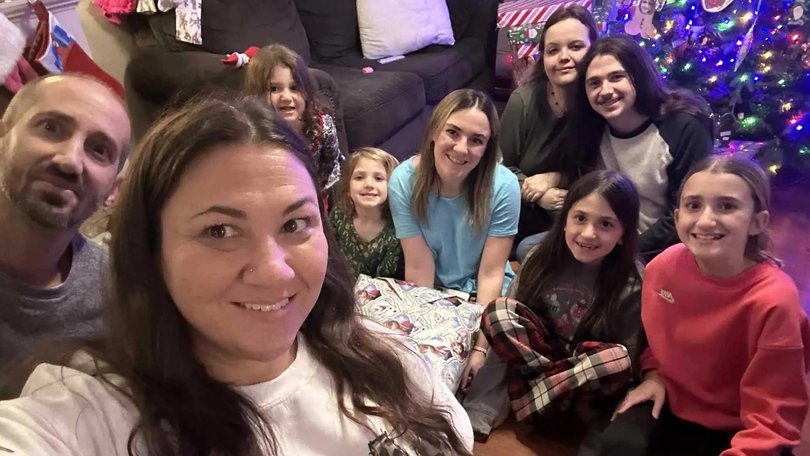Heartbreaking diagnosis for West Virginia family as four sisters found to have incurable brain condition
Families’ grief as genetic testing reveals devastating diagnosis for four sisters.

Genetic testing has proven a mother’s intuition correct after a family in the US received a devastating medical diagnosis for four siblings.
Paul and Ashlee Higginbotham of Saint Albans, West Virginia, have six children and have had to nurse four of their daughters through major surgery after the discovery.
“After six kids, you just kind of know,” mum Ashlee said after noticing something didn’t seem right with their youngest daughter, Austyn, in early 2023.
Sign up to The Nightly's newsletters.
Get the first look at the digital newspaper, curated daily stories and breaking headlines delivered to your inbox.
By continuing you agree to our Terms and Privacy Policy.“We knew something wasn’t right with Austyn. She had really bad tremors, wasn’t walking, was screaming and crying constantly, especially at night,” the couple told People.
Austyn, then 18 months old, underwent genetic testing and was discovered to have Chiari malformation, a rare condition where brain tissue extends into the spinal cord. She also had a spinal fluid blockage and compression of her spinal cord.
While medication and monitoring can be part of a treatment plan, the Mayo Clinic explains that some symptoms require surgery.
The toddler needed brain surgery, the family told CBS News, so they travelled from West Virginia to seek treatment from Dr Jeffrey Greenfield, pediatric neurosurgeon at NewYork-Presbyterian and Weill Cornell Medicine, for Austyn to have a successful surgery in March 2023.
Soon after Austin’s surgery, the family learned their three-year-old daughter Amelia also had Chiari malformation, as well as a tethered spinal cord.
That condition is when the spinal cord “abnormally attaches to your spinal canal,” restricting blood flow and causing numbness, muscle weakness or issues with motor control,” according to the Cleveland Clinic.
Like her younger sister, Amelia saw Dr Greenfield for surgery, not just for her Chiari malformation, but also to repair her tethered cord. Her surgery was in October 2023, and the family would return a month later when their daughter, Aubrey, then 7, also needed surgery for a tethered cord and Chiari malformation.
“It’s a heartbreak I can’t even describe,” Ms Higginbotham said.
“It’s terrifying. I will never forget each girl being diagnosed and the moment we found out. It never gets easier to send them into surgery. It never hurts less no matter how many times we do it.”
Finally in March this year, their 11-year-old daughter Adalee was diagnosed as having also had Chiari malformation and a tethered spinal cord, and underwent surgery for the cord, but not the malformation, which was not causing symptoms.
Then, Austyn’s symptoms re-emerged, requiring a second operation.
“The process of surgery never gets easier,” Mr Higginbotham said.
“The fifth surgical procedure … was as stressful and nerve-racking as the first surgical procedure.”
“There is still that stress factor involved anytime your child is going through a procedure involving the brain and/or spinal column and the recovery period ahead.”
The surgeon looking after the girls, Dr Greenfield, told People in a statement that “Chiari malformation is rare to begin with, occurring in about one out of every 1000 people.
“Four sisters having it is almost unheard of, and something I’ve never encountered in my career.
“It’s incredibly rewarding to be able to impact not only these children’s lives individually, but also to see how the entire family dynamic was affected — and then restored.”
“Each of these girl’s recoveries may be different, and no one can be certain that our paths won’t need to cross again, but most children, like the Higginbotham girls, should expect a normal childhood after successful Chiari surgery.
“It is such a privilege to be part of a team and hospital that can provide this kind of exceptional care to our patients for even rare conditions that aren’t well studied or understood.”
The children still have side effects, and have to travel nine hours to New York, or three and a half hours to Cincinnati Children’s Hospital for regular checkups.
“Between all of the girls, we see experts in neurology, pulmonary, hematology (three of the four girls have a platelet bleeding disorder), genetics, developmental pediatrician, ophthalmology, audiology, ENT, urology, psychology, speech pathology, rheumatology,” Ms Higginbotham said.

